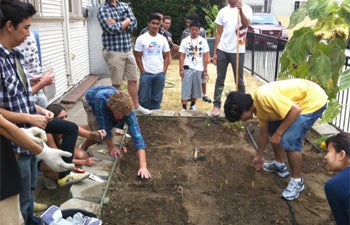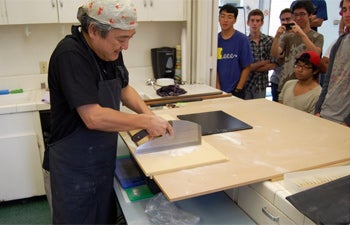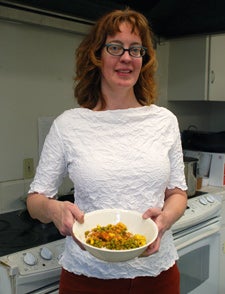Hungry Minds and Green Thumbs
Anne McKnight’s class took the idea of farm-to-table cuisine literally when they prepared lunch to mark the end of the Fall semester.
On December 2, the class of 25 students gathered in a small kitchen at the University Religious Center, where they collected ingredients including mustard greens and bok choy from the community garden plot they had been tending since September. One student even biked to the garden before class to pull daikon, a white radish, fresh from the ground.
Students prepared a lunch of curry, miso soup and rice. Several students chopped mustard greens and bok choy to add to the soup while others diced blocks of paneer, a mild Indian cheese, and combined rice and water in a large rice cooker.
Despite the number of cooks in the kitchen, the class worked together seamlessly, assigning tasks and deftly wielding knives and frying pans like a team of professional cooks.
“The teamwork in the class and the kitchen was primed by our work in the garden,” said McKnight, assistant professor of East Asian languages and literatures, and comparative literature in USC College. “The class really learned to work together.”

Students plant their plot in the USC community garden in September. Photo credit Hae-in An.
Planting and maintaining a community garden plot was one part of McKnight’s College class, “Modernology: Words, Images and Things in Modern Japan.” McKnight combined the study of food in Japanese literature and culture with topics such as nutrition, culinary fads, gardens, and food issues in the USC and Los Angeles community to explore how a culture changes and grows through food.
“Food is very intimate, it’s everyday, and it’s tied to personal and social issues,” she said.
Lucas Griffin, a biomedical engineering major at the USC Viterbi School of Engineering, was surprised at the close connection between a country’s culture and cuisine. “I didn’t think about how much food is related to stories and literature until it was made explicit,” he said.
The class worked together with the USC Office of Sustainability and the nonprofit organization Urban Farming to build their plot in the USC Community Garden. Located north of the Shrine Auditorium on the University Park Campus, the garden as a whole is maintained and harvested by volunteers from USC and the community.
“Anne’s course is a wonderful example of how students can help to create sustainable solutions on the USC campus and within the community,” said Matthew Oden, program manager of the USC Office of Sustainability. “She developed a curriculum that allows students to grow food in an urban environment. I think they learn a lot from these practical experiences about what it takes to move the university further towards sustainability.”
In preparation for gardening, McKnight invited Florence Nishida, master gardener from the Natural History Museum of Los Angeles County, to teach the class about planting, composting and sustainability issues. After several workshops with Nishida, the students worked on their garden in early September, planting pumpkins, radishes, shishito peppers, bok choy, tomatoes, mustard greens and daikon.
Mid-semester, the class was treated a soba noodle demonstration by Sonoko Sakai, Los Angeles Times writer and chef, and chef Akila Inouye from the Tsukiji Soba Academy in Tokyo.

Chef Akila Inouye from the Tsukiji Soba Academy in Tokyo demonstrates how to cut fresh soba noodles. Photo credit D.J. Hsueh.
For the students, the opportunity to step outside of the classroom into the kitchen and garden made for a memorable experience, and this mix of classroom and experiential learning was one of McKnight’s goals. “Having all of these hands-on activities made it more than just a class,” said Rachel Chan, a business administration major at the USC Marshall School of Business.
“In addition to learning many different philosophies throughout Japan, we learned how to apply our newfound knowledge to our modern lives,” said Benjamin Kaufman, a neuroscience major in the College. “We also learned how to become efficient gardeners, bolstering several different gardening techniques that we were exposed to, whether it was from our friendly master gardener Florence Nishida, or from the different ancient techniques we read about.”
In addition to maintaining a garden, the class also created a blog called Edible Education (edibleeducation.wordpress.com) on which McKnight and the students posted gardening tasks, class assignments, photos and thoughts on course material.

Anne McKnight, assistant professor of East Asian languages and literatures, and comparative literature in USC College, shows off her bowl of paneer curry. Photo credit Laurie Moore.
At the end of a semester of learning about Japanese food, culture, literature and agriculture, the students were ready to reap the fruit of their labors. As students helped themselves to bowls of steaming rice, soup and curry, Patrick Lee, a College biochemistry major, noted the pay-off for a semester of reading, writing and gardening: “The best part is we get to eat!”